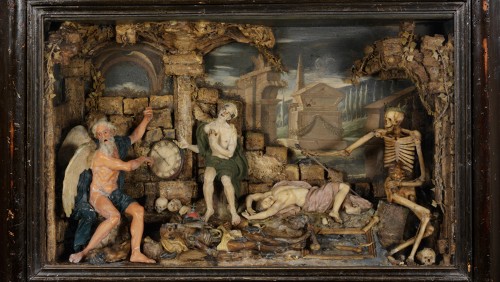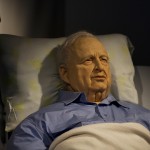Time and Death, wax relief, Italy, probably before 1727 [Source]
The Falconer Bill on assisted dying is making its way through the Lords before going on to the Commons, and the familiar debate rages once more. The usual suspects oppose it. They include senior doctors and lawyers and, you probably think, a lot of religious people, yes? And disabled people?
Actually, the stats show support for assisted dying as follows:
- * General population: 80%
- * Religious people: anywhere between 60% and 80% depending on how you ask the question.
- * Disabled people: 75%
The principal players in the battle are, on one side, those who argue for personal autonomy and the right of anyone to die when they damn well please (terms and conditions apply), versus, on the other, those who seek to safeguard the interests of the vulnerable, whether elderly or disabled — those who might come under pressure to do away with themselves. Should the Bill become law, there is the customary fear of slippery slopes and thin ends of wedges. It’s certainly true to say that the original Abortion Act never envisaged or intended that there should be so many abortions — but for all that, abortion rides high in the public’s favour.
The argument about assisted dying is one that needs to be heard; the law, when it comes, needs to be a good one. The eventual outcome is a forgone conclusion, of course. If it be not now, yet it will come.
It’s perhaps regrettable that the Bill uses the euphemism ‘assisted dying’. What it means is assisted suicide – a doctor enables vetted people to kill themselves by handing them a fatal cocktail. One thing it is not is euthanasia, where it’s the doctor who does the killing. If the Bill becomes law, euthanasia will still be murder.
Falconer’s Bill is pretty much a carbon copy of Oregon’s Death with Dignity Act of 2007. If you want to see how things are likely to pan out here in Britain, see how they have panned out over there.
And if you want to find out precisely when you are going to die, click here. If you want to watch a US tv series showing people dying in real life, click here.
The interesting thing about the debate about assisted dying is that it is taking place in the context of new science which is continuously calling for a reappraisal of the definition of death. At what point can we say that someone is dead?
Take Ariel Sharon. Remember him? Prime minister of Israel. Had a huge stroke in 2006. Yes, that one.
He’s still alive, lingering on in a permanent vegetative state (pic below).
Once upon a time death was cardio-pulmonary death. Still is. But when technology made it possible sometimes to restore cardio-pulmonary function, but not consciousness, a redefinition was required. It’s called brain stem death. In nautical terms, the bridge has been wiped out, but the engine room is still humming.
Brain stem death describes not loss of consciousness but the end of consciousness. Brain stem death is the point at which living organs can legally be harvested — and give a new lease of life to dying people. How dead is that? How dead are you when your heart literally goes, in the words of the song, on? A brain-dead pregnant mother nourished a foetus for 107 days and gave birth to a healthy child.
Which is why some people deny that brain stem death is death.
Twenty years ago an MRI scan of a stroke patient might have shown them to be utterly dead. Today, tissue plasminogen activator can restore them to unimpaired health.
What price, then, the irreversibility of death?
How would we define death in the as-yet hypothetical case of someone’s brain being transplanted from their dead — in a cardio-pulmonary sense — body into a de-brained but otherwise healthy body?
Take it a stage further: if death is the cessation of life, what is life?
Some people propose that death should be defined as the irreversible loss of personhood — the point at which you can declare that Elvis has left the building and ain’t coming back. Okay then, if so, when do you call time of death on a demented person? How do you address the matter of the still-beating heart?
And yes, what constitutes “a person”?
Over in America, Dr Sam Parnia is now reviving people who have died of a heart attack several hours after they have died, and he reckons that in 10-20 years’ time it’ll be possible to resurrect dead people after 24 hours. Parnia even proposes allowing a person who has died of, say, pneumonia, to remain dead while an antibiotic goes on working to kill the disease, and then, when they’re ‘well’ again, bringing them back to life.
Understand this: brain death is nowhere near an event. It’s a process that takes longer than anyone thought. The brain goes on dying for hours after the heart has stopped beating. So: what levels of awareness do we retain after our death, and for how long?
It’s science that’s altering the definition of death in the modern age. Many religions have, for centuries, thought of death, not as a full and final event, but as a time of transition. Science has not ruled out continuing consciousness. Sam Parnia, who has for years collected the recollections of the out-of-body experiences of those of his patients who have died for a short time, offers this caveat to those who think that the seat of selfhood is the brain:
“We always assume that all scientists believe the brain produces the mind, but in fact there are plenty who are not certain of that. Even prominent neuroscientists, such as Sir John Eccles, a Nobel prizewinner, believe that we are never going to understand mind through neuronal activity. All I can say is what I have observed from my work. It seems that when consciousness shuts down in death, psyche, or soul – by which I don’t mean ghosts, I mean your individual self – persists for a least those hours before you are resuscitated. From which we might justifiably begin to conclude that the brain is acting as an intermediary to manifest your idea of soul or self but it may not be the source or originator of it… I think that the evidence is beginning to suggest that we should keep open our minds to the possibility that memory, while obviously a scientific entity of some kind – I’m not saying it is magic or anything like that – is not neuronal.”
If you’ve got an hour and a quarter, this is well worth watching:




Great post! Just wanted to say thanks.
An insightful overview of this hugely complex and emotive issue. There is so much misinformation out there and it is not helped by the over simplistic and sensationalist media coverage. There should be an independent organisation which presents the facts and the implications before a public referendum vote. This issue will not go away. In this country we are living longer with more complex health and social care needs.